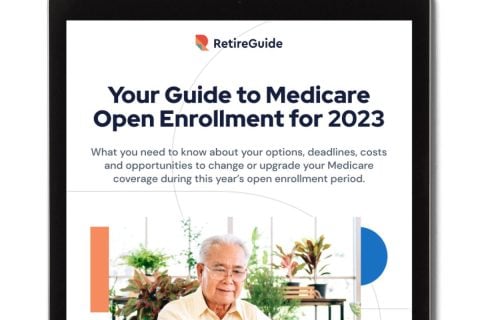Eligibility & Enrollment for Medicare
You’re likely to qualify for Medicare when you turn 65 if you meet the eligibility requirements. There are some exceptions, including certain disabilities, that can qualify you for coverage sooner. Your initial enrollment is open for seven months, but there are other windows as well. You can face higher costs if you delay enrollment.

- Written by Lindsey Crossmier
Lindsey Crossmier
Financial Writer
Lindsey Crossmier is an accomplished writer with experience working for The Florida Review and Bookstar PR. As a financial writer, she covers Medicare, life insurance and dental insurance topics for RetireGuide. Research-based data drives her work.
Read More- Edited By
Lamia Chowdhury
Lamia Chowdhury
Financial Editor
Lamia Chowdhury is a financial content editor for RetireGuide and has over three years of marketing experience in the finance industry. She has written copy for both digital and print pieces ranging from blogs, radio scripts and search ads to billboards, brochures, mailers and more.
Read More- Reviewed By
Michael Jones
Michael Jones
Medicare Expert and Owner of Grand Anchor Insurance Solutions
Michael Jones is a licensed insurance agent who manages his own agency called Grand Anchor Insurance Solutions. In addition to being a Medicare expert, Michael specializes in other insurance products such as voluntary benefits for employees of businesses.
Read More- Published: April 28, 2020
- Updated: March 26, 2025
- 4 min read time
- This page features 7 Cited Research Articles
Have you selected your 2025 Medicare plan?Maximize your Medicare savings by connecting with a licensed insurance agent.Medicare Eligibility & Enrollment Basics
Bob Glaze | 1:14 Who is eligible for Original Medicare? Have you selected your 2025 Medicare plan?Replay VideoBob Glaze, a licensed insurance agent, explains who is eligible to enroll in Original Medicare.
Have you selected your 2025 Medicare plan?Replay VideoBob Glaze, a licensed insurance agent, explains who is eligible to enroll in Original Medicare.Frequently Asked Questions About Medicare Eligibility & Enrollment
Who is eligible for Medicare?You’re typically eligible for Medicare when you turn 65 if you are a U.S. citizen or permanent legal resident. You can become eligible at a younger age if you have certain rare conditions or disabilities like amyotrophic lateral sclerosis (ALS) or end-stage renal disease. To qualify for premium-free Part A, you must have worked and paid Medicare payroll taxes for at least 10 years.When are you eligible for Medicare?You have a window to enroll in Medicare that begins three months before the month of your 65th birthday and ends three months after. You may be automatically enrolled at 65 if you are already receiving Social Security benefits.Does income affect eligibility for Medicare?Income does not affect your eligibility for Medicare but may impact how much you pay for it. According to the U.S. Centers for Medicare & Medicaid Services, your Part B premium, which is typically $185 in 2025, can increase depending on your level of income.Is Medicare enrollment automatic at age 65?Medicare enrollment is automatic only if you are already receiving Social Security benefits. If you have not received Social Security benefits, you must enroll for Medicare online, by phone or in person at your local Social Security office.Is enrolling in Medicare mandatory?You are not required to sign up for Medicare when you turn 65 — it’s optional. But if you wait until after you turn 65 to sign up, you could face penalties later.What happens if I miss my Medicare enrollment?If you miss your initial or special enrollment periods, you can still enroll in Medicare during the next open enrollment period. But you may face additional monthly penalties, which are added to your Medicare Part B and Part D premiums.When will I get my Medicare card?If you manually enroll, you will get your Medicare card in your welcome package about two weeks after you sign up. If you are already receiving Social Security benefits before you turn 65, you’ll be automatically enrolled, and your Medicare card will be mailed to you before your 65th birthday. You can also print one from the Medicare website.How do I check the status of my Medicare enrollment?You can check the status of your Medicare enrollment online through your My Social Security account on the Social Security website or the “Check Enrollment” section of your Medicare account. You can also call the Social Security Administration at 1-800-772-1213 or go to a local office near you.When is the Medicare open enrollment period?The Medicare open enrollment period is Oct. 15 to Dec. 7 each year. You will be able to enroll in Medicare coverage during that time if you didn't enroll during your initial or special enrollment period.Key Eligibility & Enrollment Terms
Learn about these key terms to better understand eligibility and enrollment for Medicare.
- Annual Enrollment Period
- Medicare’s annual enrollment period is Oct. 15 – Dec. 7. The annual enrollment period is for those who already have signed up for Medicare before and are looking to change or update coverage.
- Auto-Enrollment
- You are automatically enrolled in Medicare if you’ve already been receiving benefits from Social Security for at least 24 months.
- Beneficiary
- The beneficiary is the person who receives Medicare benefits.
- Dual Eligibility
- If you have dual eligibility, then you’re eligible for both Medicare and Medicaid.
- Facilitated Enrollment Notice
- A facilitated enrollment notice — also known as a GREEN notice — informs you that if you qualify for Extra Help, you’ll be automatically enrolled in a Part D drug plan if you don’t enroll in one or decline coverage.
- Initial Enrollment Period
- Your initial enrollment period begins three months before your 65th birthday and ends three months after. This is for beneficiaries looking to enroll in Medicare for the first time.
- Late Enrollment Penalty
- If you don’t sign up for Medicare once you’re eligible, you could face a Part A, Part B or Part D late enrollment penalty, which increases your premium cost.
- Special Enrollment Period
- A special enrollment period is for individuals who missed their original enrollment period for Medicare. There are specific instances to qualify for a special enrollment period.
John Clark, CLTC®, NSSA® | 0:47 When and how do I enroll in Medicare? Speak to a Medicare ProfessionalReplay VideoJohn Clark, licensed insurance advisor and owner of Senior Solutions Insurance Agency, explains Medicare eligibility and the three ways to sign up for coverage.3 Minute Quiz: Can You Retire Comfortably?Take our free quiz & match with a financial advisor in 3 easy steps. Tailored to your goals. Near you or online.
Speak to a Medicare ProfessionalReplay VideoJohn Clark, licensed insurance advisor and owner of Senior Solutions Insurance Agency, explains Medicare eligibility and the three ways to sign up for coverage.3 Minute Quiz: Can You Retire Comfortably?Take our free quiz & match with a financial advisor in 3 easy steps. Tailored to your goals. Near you or online.Writer Ashley Donohoe contributed to this article.
Last Modified: March 26, 2025Share This Page7 Cited Research Articles
- U.S. Centers for Medicare & Medicaid Services. (2025, January). Medicare. Retrieved from https://www.ssa.gov/pubs/EN-05-10043.pdf
- U.S. Centers for U.S. Medicare & Medicaid Services. (2024, November 8). 2025 Medicare Parts A & B Premiums and Deductibles. Retrieved from https://www.cms.gov/newsroom/fact-sheets/2025-medicare-parts-b-premiums-and-deductibles
- Robinson, C. J. (n.d.). Understanding Medicare Enrollment Periods (and When You Can Change Your Medicare Plan) Retrieved from https://www.aetna.com/medicare/understanding-medicare/medicare-enrollment-periods-what-to-know.html
- U.S. Centers for Medicare & Medicaid Services. (n.d.). Facilitated Enrollment Notice. Retrieved from https://www.medicare.gov/basics/forms-publications-mailings/mailings/help-with-costs/reminder-join-drug-plan
- U.S. Centers for Medicare & Medicaid Services. (n.d.). How Do I Sign Up for Medicare? Retrieved from https://www.medicare.gov/basics/get-started-with-medicare/sign-up/how-do-i-sign-up-for-medicare
- U.S. Centers for Medicare & Medicaid Services. (n.d.). Log in or Create an Account. Retrieved from https://www.medicare.gov/account/login
- U.S. Centers for Medicare & Medicaid Services. (n.d.). “Welcome to Medicare” Package (Not Automatically Enrolled). Retrieved from https://www.medicare.gov/basics/forms-publications-mailings/mailings/signing-up/welcome-to-medicare-package
- Edited By
Calling this number connects you to one of our trusted partners.
If you're interested in help navigating your options, a representative will provide you with a free, no-obligation consultation.
Our partners are committed to excellent customer service. They can match you with a qualified professional for your unique objectives.
We/Our Partners do not offer every plan available in your area. Any information provided is limited to those plans offered in your area. Please contact Medicare.gov or 1-800-MEDICARE to get information on all of your options.
866-749-5443Your web browser is no longer supported by Microsoft. Update your browser for more security, speed and compatibility.
If you need help pricing and building your medicare plan, call us at 844-572-0696






